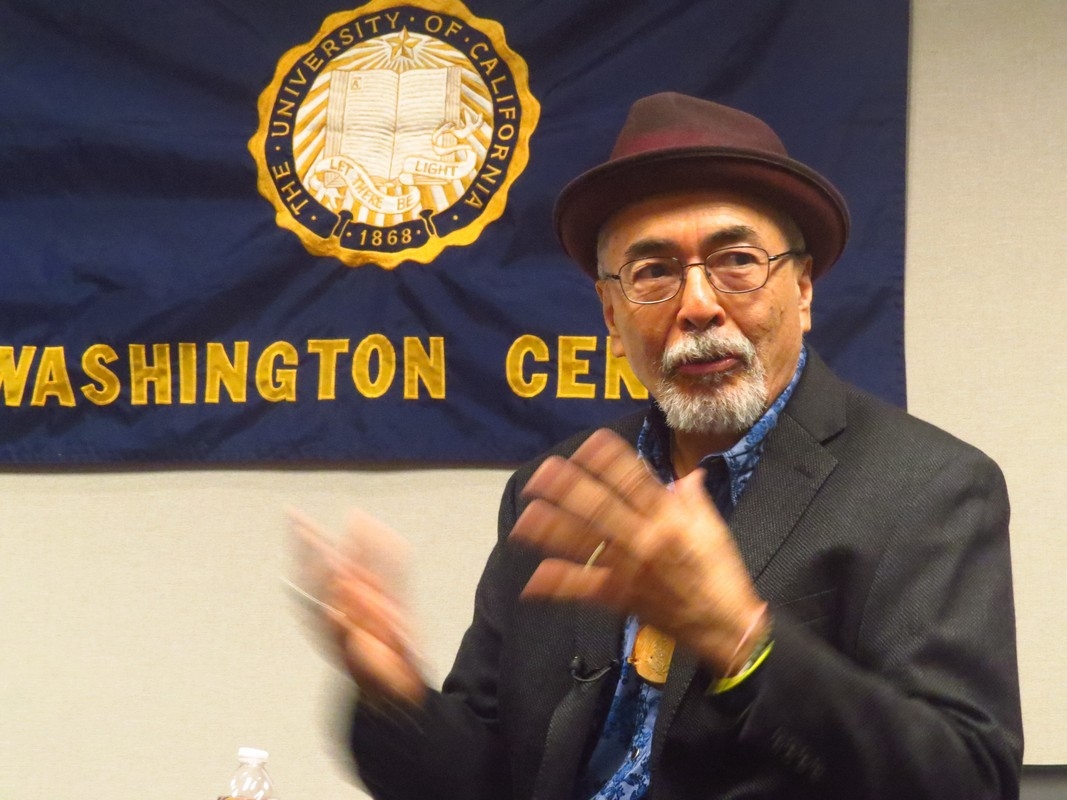We had lunch at Sonoma on Pennsylvania
—minutes from the Library. Afterwards, I walked him back to the Jefferson Building
where I’d picked him up at noon. We took a selfie
to mark the day. Before we said our goodbyes
I leaned in and whispered
be sure to read your poems tonight
*
You see, I’d been hearing him share his work in public since the mid-eighties…
On September 15, 2015, to inaugurate what would be his two-year stint as
PLOTUS
Juan Felipe Herrera was brilliant
In all candor, it had to do with inhabiting what I’ll call
his sweet spot:
70% performing poems
30% charming chatter
*
For the latter, the pinnacle was re-telling
the story
of his third grade teacher
“Juan/John, can you come to the front of the class and sing a song,” he recounted
And Juanito sang, Three Blind Mice
“You have a beautiful voice,” she said.
And then a pause, with PLOTUS stretching out both his arms, pointing them to the front row
“And Mrs. Sampson is right here. Let’s give her a hand…”
“It was your words that made it all happen for me. That’s all it took. Those five words.”
*
Ron Charles, in his piece in the Washington Post, wrote: “His inaugural reading was infused with humility and graciousness, but it was also an elaborately choreographed event informed by his years as a teacher and activist.” Indeed.
After reading two early poems (“Let us gather in a flourishing way” and “Exiles”), something magical happened. He invited onto the stage Juan Díaz, master of the Mexican corrido. Earlier that day, Díaz had led a Spanish-language workshop on the corrido, whose English equivalent is the ballad. The workshop participants had brainstormed current events as possible subjects for a corrido. After a gathering consensus around a particular topic, the group worked collectively to write a corrido, paying particular attention, under Díaz’s guidance, to the traits of a Spanish-language ballad—the meter, the rhyme, etc.
The resulting text was shared that night with the guitar and voice of Juan Díaz. He occupied center stage as he played and sang. Off to the side, at the podium, PLOTUS offered an interspersed, hauntingly delivered, English-translation of
The Ballad of Sandra Bland
That gesture—of sharing the stage—is emblematic of his laureateship. It wasn’t really about his lone voice. It was about embodying the ethos instilled in him by Mrs. Sampson—of traveling the states incessantly, and discovering and amplifying the multiplicity of voices in this nation.
It was no surprise, then, that the “lecture” that marked the closing of his first term—a presentation he titled “Pioneers of Flower and Song” delivered on April 16, 2016—was, in essence, a commented slide show on the Chicano and Chicana poets who formed him.
And towards the end of that event, as if to point towards the future of Latinx poetry, he invited onto the stage 11-year-old Sarita Sol González (from New Mexico) and 12-year-old Elena Medina (from California) to each share a poem. He’d met these young poets during his travels.
It was his opportunity, then, to pay it forward
“You have a beautiful voice”

Juan Felipe Herrera, Poet Laureate Consultant in Poetry to the Library of Congress, speaks at the University of California’s Washington Center, Washington, DC, April 24, 2017. Photo by Dan Vera.
Francisco Aragón is the son of Nicaraguan immigrants. He is the author of After Rubén, (forthcoming in 2020 from Red Hen Press), His Tongue a Swath of Sky (a limited edition chapbook, momotombito press, 2019), Glow of Our Sweat (Scapegoat Press, 2010), and Puerta del Sol (Bilingual Press, 2005), as well as the editor of the anthology The Wind Shifts: New Latino Poetry (University of Arizona Press, 2007). In 2017, he was a finalist for Split This Rock’s Freedom Plow Award. He directs Letras Latinas, the literary initiative at the University of Notre Dame’s Institute for Latino Studies. A native of San Francisco, he divides his time between Arlington, Virginia, and South Bend, Indiana. As a translator from the Spanish, Aragón has had a hand in a number of books, including volumes by Francisco X. Alarcón (1954 – 2016) and Federico García Lorca (1888 – 1936). More recently he’s been rendering into English versions of Rubén Darío (1867 – 1916). His translations have appeared in Chain, Chelsea, Jacket, Nimrod, and Zyzzyva. Other web pages for this author on Beltway Poetry: Francisco Aragón: Summer 2007 Francisco Aragón: Museum Issue